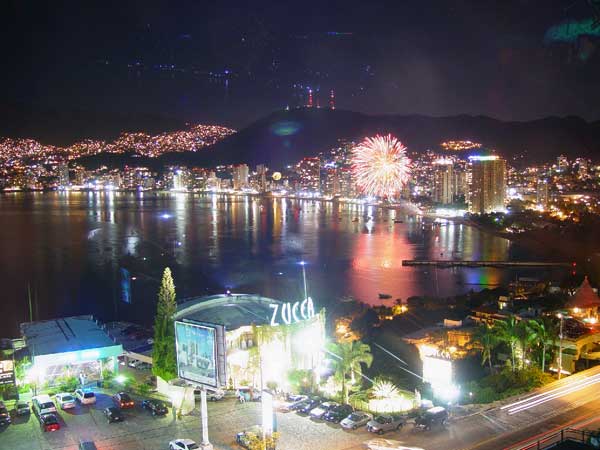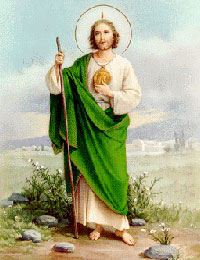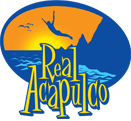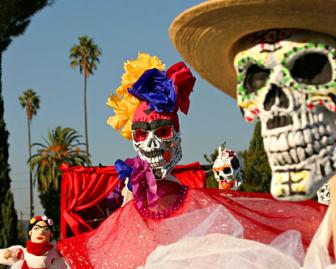Happenings, Holidays & Events
Acapulco celebrates whenever it can. The town always fills up for special holidays and long weekends throughout the year. Some events, like Halloween and Spring Break, did not originate with the local culture, but have come instead from outside, with the tourists and vacationers who arrive to have a great time. Others have a long tradition, mainly as religious celebrations within the calendar of the Roman Catholic Church. Several "official" holidays trigger a day off for workers (or double pay if they have to be on the job). Though they have specific dates, they are mostly observed on a Monday (such as the third Monday in March for Benito Juarez's birthday). For statutory holidays that are not always observed on a Monday, the following rule applies: If it falls on Saturday, the day off is on Friday. If it falls on Sunday, Monday is the day off. These holidays create several "long weekends" or "puentes," when tourists make their way to Acapulco's sunny beaches. A third category, "civil holidays," are dates of some note, but they are not official.
 Locals celebrate Christmas on the eve, December 24. This is when family presents are exchanged. The previous day, December 23, is probably the busiest shopping day of the whole year.
The week between Christmas Day and New Years' Day is probably Acapulco's busiest tourist time of year. Rates for hotels, condos and villas are at premium levels, and the beaches are filled with travelers from all over the world, looking for a respite from winter on the tropical sands of the bay.
Twelve days after Christmas, with the arrival of Epiphany on January 6, locals often share with friends and family a "rosca" or large, ring-shaped sweet roll with sugar and fruits, often accompanied by hot chocolate or atole, a delicious oatmeal drink, served hot. Inside the rosca some lucky person will find a small image of the Christ child, which can be exchanged for a treat or prize. Larger roscas may have several of them. This tradition is always good fun for all. This day, also called Reyes Magos (or King-Wise Men), was, for generations past, the traditional time of Christmas gift giving. Even today, parents will give toys to their children as if from the "Reyes Magos," and friends often exchange small gifts as well.
Locals celebrate Christmas on the eve, December 24. This is when family presents are exchanged. The previous day, December 23, is probably the busiest shopping day of the whole year.
The week between Christmas Day and New Years' Day is probably Acapulco's busiest tourist time of year. Rates for hotels, condos and villas are at premium levels, and the beaches are filled with travelers from all over the world, looking for a respite from winter on the tropical sands of the bay.
Twelve days after Christmas, with the arrival of Epiphany on January 6, locals often share with friends and family a "rosca" or large, ring-shaped sweet roll with sugar and fruits, often accompanied by hot chocolate or atole, a delicious oatmeal drink, served hot. Inside the rosca some lucky person will find a small image of the Christ child, which can be exchanged for a treat or prize. Larger roscas may have several of them. This tradition is always good fun for all. This day, also called Reyes Magos (or King-Wise Men), was, for generations past, the traditional time of Christmas gift giving. Even today, parents will give toys to their children as if from the "Reyes Magos," and friends often exchange small gifts as well.
 October 28 is Día de San Judas Tadeo (Saint Jude or Thaddeus, the apostle). As the patron saint of desperate cases and hopeless causes, this saint has acquired a large following among Mexicans, who take to the streets on this day with processions.
November 1 is All Saints Day, followed by All Souls Day or Day of the Dead on November 2. In many parts of Mexico the traditions blend pre-Columbian rituals of honoring the departed with Roman Catholic tradition. November 2 is a day set aside in many cultures for cleaning up the cemetery plots.
December 12 is the feast day of the patron saint of Mexico, the Virgin of Guadalupe. Many of the faithful organize processions in the streets, carrying images of the Virgin. The day kicks off the Christmas season, as four days later, "Posadas" starts, a time of year-end Christmas parties and observances that run through January 6. The "Posada" was the inn where Joseph and Mary took refuge and where she gave birth to Jesus.
October 28 is Día de San Judas Tadeo (Saint Jude or Thaddeus, the apostle). As the patron saint of desperate cases and hopeless causes, this saint has acquired a large following among Mexicans, who take to the streets on this day with processions.
November 1 is All Saints Day, followed by All Souls Day or Day of the Dead on November 2. In many parts of Mexico the traditions blend pre-Columbian rituals of honoring the departed with Roman Catholic tradition. November 2 is a day set aside in many cultures for cleaning up the cemetery plots.
December 12 is the feast day of the patron saint of Mexico, the Virgin of Guadalupe. Many of the faithful organize processions in the streets, carrying images of the Virgin. The day kicks off the Christmas season, as four days later, "Posadas" starts, a time of year-end Christmas parties and observances that run through January 6. The "Posada" was the inn where Joseph and Mary took refuge and where she gave birth to Jesus.
Christmas and New Years

Holy Week and Spring Break
Holy Week, the week before Easter, is probably Acapulco's second busiest time for tourism, as the kids are out of school, and whole families will take off for a week at the sea shore. Hotels and condos are usually fully booked, and at premium rates. The week after Easter (Easter Week), is still busy, but not nearly as active. Easter falls on a different day each year, being the Sunday after the first full moon that follows the Spring equinox. Spring Break is hardly an official holiday, but it is a time when Acapulco takes on a different look. While the schools and universities in Mexico have their Spring break for Holy Week, the universities in the US and Canada have different schedules. College students enjoy coming to Acapulco for their week (or two) of Spring vacation. This can be any time between late February and mid-April. Most Acapulco businesses are glad to see the arrival of these youths, and often special events are planned up and down the main Spring Break venues, from the Emporio at Diana, past Condesa, to the Copacabana, close to the Convention Center.National Holidays
The first Monday in February is celebrated as Constitution Day (traditionally, February 5). This creates a nice three-day weekend for people who want to come to Acapulco for a short vacation. The third Monday in March is the day to celebrate Benito Juarez's birthday. May 1 is Labor Day in Mexico. It does not move to a nearby Monday, so the holiday can create and unofficial three- or four-day weekend for beach visitors. September 16 is National Independence Day. It commemorates Father Miguel Hidalgo's "Grito de Dolores" ("Viva México!"), which launched Mexico's official struggle to be free from Spain. The year 2010 is the Bicentennial celebration. The third Monday in November is Revolution Day. It is reserved to celebrate the start of the Mexican Revolution on November 20, 1910, by Francisco I. Madero. The year 2010 is the centennial celebration.Civil Holidays (No day off)
May 5, or "Cinco de Mayo" is a civil holiday in Mexico, but not a "legal holiday." In Acapulco, no one takes much note of it. It celebrates a Mexican military victory over French forces in Puebla, in 1862. Cinco de Mayo is more of a creation of the Hispanic community in the US than a traditional Mexican celebration. May 10 is Mother's Day. It is considerably more important in Mexico than in Anglo cultures. Curiously, the beaches are usually empty, as everyone is off spending some time with mom instead. It is a civil holiday, with no day off for workers. October 12 celebrates Columbus's discovery of America. Called variously Día de la Hispanidad or Día de la Raza, it is a civil holiday, so no one gets the day off. October 31 is Halloween. Though not celebrated to the extent of Halloween in the US, Acapulco does enjoy throwing costume parties, and kids have learned the skill of going out to "trick or treat" (although when they get to a door they yell "Halloweeeeen!" instead of "trick or treat").More Religious Observances


